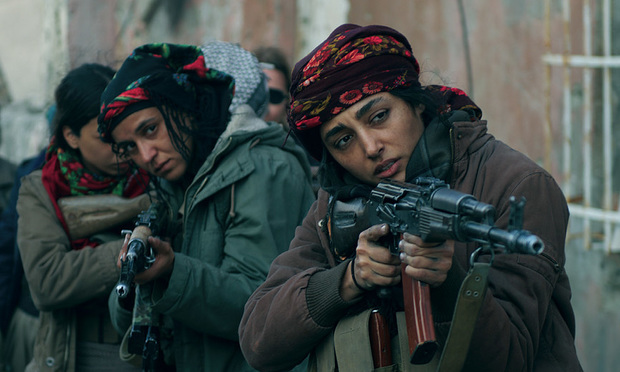Fighting ISIS, Kurdish Lawyer Takes Work-Life Balance to a New Level
The chair of Holland & Knight's national appellate team and Atlanta's litigation practice group concludes that the film "Girls of the Sun" is a good story for giving women a chance and a stronger foothold in the film industry and the world.
May 24, 2018 at 12:24 PM
4 minute read
 Film still from “Girls of the Sun.” (Courtesy photo)
Film still from “Girls of the Sun.” (Courtesy photo)
When I go to the Cannes Film Festival, I look for a lawyer-related movie to write about. Last year, I saw “Mayhem,” a horror film starring former “Walking Dead” actor, Steven Yeun, who fought his way out of a quarantined building after an anti-inhibitor virus had attacked the Big Law tenant causing everyone (from senior partner to mailroom clerk) to act out their wildest impulses. This year I saw a different type of horror film—one based on true events.
“Girls of the Sun” portrays a woman lawyer, Bahar, who shifted from the usual challenges of work-life balance to those of a veritable superhero. ISIS militants invaded her town in Kurdistan, rounded up and killed the men, captured then sold the women and girls as sex slaves and put the young boys into training “schools.” This story has been told through news reports about the all-female battalions (peshmerga or YPJ) who have fought in Iraq's Yazidi territory and across the border in Syria. But it takes on another dimension as a feature film—one of the few films selected for the official competition at Cannes.
The story is told by a French journalist (a Marie Colvin look-alike), and it is a real tear-jerker. After seeing her husband killed and her son abducted, Bahar is enslaved and sold four times before she escapes. She laments that it is even worse for the girls as young as 9 years old who are sought the most. After gaining her freedom, Bahar forms a military unit comprised entirely of former captives. These women look like other soldiers dressed in camouflage with one distinction that is prominent in the film as well as the news footage. They all wear scarves bounded by colorful floral designs or ornaments. They really are quite beautiful.
Bahar and her battalion pursue a daring strategy to retake her town by fighting through a mined tunnel. The visual and sound effects are worthy of any war movie. But again there is a distinction not found elsewhere—the women's voices. This is significant, as the jihadists believe that getting killed by a woman keeps them from entering paradise. Bahar and her troop know this, so they sing loudly going into battle. They sing a song that, when translated from Kurdish, tells of “a new era of women, life and liberty”!
Of course, it is not just the extremists who suffer in this campaign. Some of Bahar's soldiers die, too. And there is the sadness over lost husbands and children, but writer-director Eva Husson provides a Hollywood-style happy ending.
The female defeat of ISIS fighters makes an extraordinary story whether presented through news clips or this dramatic film. The movie stands out, however, because it not only has strong female leads, with Iranian actress Golshifteh Farahani as Bahar, it also has Husson. She is one of only 82 female directors of the 1,727 directors who have walked the red carpet at Cannes—a point noted by the president of this year's Cannes jury, Cate Blanchett. Yes, it is time for change in the film industry and the world. And I cannot think of a better story for giving women a chance.
 Laurie Webb Daniel, Holland & Knight, Atlanta (Photo: John Disney/ALM)
Laurie Webb Daniel, Holland & Knight, Atlanta (Photo: John Disney/ALM)Laurie Webb Daniel chairs Holland & Knight's national appellate team and leads the firm's Atlanta litigation practice group.
This content has been archived. It is available through our partners, LexisNexis® and Bloomberg Law.
To view this content, please continue to their sites.
Not a Lexis Subscriber?
Subscribe Now
Not a Bloomberg Law Subscriber?
Subscribe Now
NOT FOR REPRINT
© 2025 ALM Global, LLC, All Rights Reserved. Request academic re-use from www.copyright.com. All other uses, submit a request to [email protected]. For more information visit Asset & Logo Licensing.
You Might Like
View All
CFPB Proposes Rule to Regulate Data Brokers Selling Sensitive Information
5 minute read

Trending Stories
- 1FTC Chair Lina Khan Sues John Deere Over 'Right to Repair,' Infuriates Successor
- 2‘Facebook’s Descent Into Toxic Masculinity’ Prompts Stanford Professor to Drop Meta as Client
- 3Pa. Superior Court: Sorority's Interview Notes Not Shielded From Discovery in Lawsuit Over Student's Death
- 4Kraken’s Chief Legal Officer Exits, Eyes Role in Trump Administration
- 5DOT Nominee Duffy Pledges Safety, Faster Infrastructure Spending in Confirmation Hearing
Who Got The Work
J. Brugh Lower of Gibbons has entered an appearance for industrial equipment supplier Devco Corporation in a pending trademark infringement lawsuit. The suit, accusing the defendant of selling knock-off Graco products, was filed Dec. 18 in New Jersey District Court by Rivkin Radler on behalf of Graco Inc. and Graco Minnesota. The case, assigned to U.S. District Judge Zahid N. Quraishi, is 3:24-cv-11294, Graco Inc. et al v. Devco Corporation.
Who Got The Work
Rebecca Maller-Stein and Kent A. Yalowitz of Arnold & Porter Kaye Scholer have entered their appearances for Hanaco Venture Capital and its executives, Lior Prosor and David Frankel, in a pending securities lawsuit. The action, filed on Dec. 24 in New York Southern District Court by Zell, Aron & Co. on behalf of Goldeneye Advisors, accuses the defendants of negligently and fraudulently managing the plaintiff's $1 million investment. The case, assigned to U.S. District Judge Vernon S. Broderick, is 1:24-cv-09918, Goldeneye Advisors, LLC v. Hanaco Venture Capital, Ltd. et al.
Who Got The Work
Attorneys from A&O Shearman has stepped in as defense counsel for Toronto-Dominion Bank and other defendants in a pending securities class action. The suit, filed Dec. 11 in New York Southern District Court by Bleichmar Fonti & Auld, accuses the defendants of concealing the bank's 'pervasive' deficiencies in regards to its compliance with the Bank Secrecy Act and the quality of its anti-money laundering controls. The case, assigned to U.S. District Judge Arun Subramanian, is 1:24-cv-09445, Gonzalez v. The Toronto-Dominion Bank et al.
Who Got The Work
Crown Castle International, a Pennsylvania company providing shared communications infrastructure, has turned to Luke D. Wolf of Gordon Rees Scully Mansukhani to fend off a pending breach-of-contract lawsuit. The court action, filed Nov. 25 in Michigan Eastern District Court by Hooper Hathaway PC on behalf of The Town Residences LLC, accuses Crown Castle of failing to transfer approximately $30,000 in utility payments from T-Mobile in breach of a roof-top lease and assignment agreement. The case, assigned to U.S. District Judge Susan K. Declercq, is 2:24-cv-13131, The Town Residences LLC v. T-Mobile US, Inc. et al.
Who Got The Work
Wilfred P. Coronato and Daniel M. Schwartz of McCarter & English have stepped in as defense counsel to Electrolux Home Products Inc. in a pending product liability lawsuit. The court action, filed Nov. 26 in New York Eastern District Court by Poulos Lopiccolo PC and Nagel Rice LLP on behalf of David Stern, alleges that the defendant's refrigerators’ drawers and shelving repeatedly break and fall apart within months after purchase. The case, assigned to U.S. District Judge Joan M. Azrack, is 2:24-cv-08204, Stern v. Electrolux Home Products, Inc.
Featured Firms
Law Offices of Gary Martin Hays & Associates, P.C.
(470) 294-1674
Law Offices of Mark E. Salomone
(857) 444-6468
Smith & Hassler
(713) 739-1250







